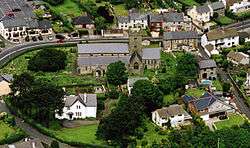Coychurch
| Coychurch | |
| Welsh: Llangrallo | |
 St.Crallo's Church, Coychurch |
|
 Coychurch |
|
| OS grid reference | SS939788 |
|---|---|
| Community | Coychurch Lower |
| Principal area | Bridgend |
| Ceremonial county | Mid Glamorgan |
| Country | Wales |
| Sovereign state | United Kingdom |
| Post town | BRIDGEND |
| Postcode district | CF31 |
| Dialling code | 01656 |
| Police | South Wales |
| Fire | South Wales |
| Ambulance | Welsh |
| EU Parliament | Wales |
| UK Parliament | Bridgend |
| Welsh Assembly | Bridgend |
Coordinates: 51°29′54″N 3°31′44″W / 51.498395°N 3.528979°W
Coychurch (Welsh: Llangrallo) is a small village that sits between Pencoed and Bridgend in Wales, bordering with Bridgend Industrial Estate, where many residents are employed. It is part of the community of Coychurch Lower.[1]
History
The village has a long-standing religious association, with an early Christian church having been built there possibly as long ago as the 8th century CE. The current church of St Crallo was built in the 13th century, and is a Grade I listed building, very large in size for the village it serves.[2] A medieval cross in the churchyard, close to the church's south door, is Grade II* listed.[3] John Wesley is said to have included the church in his preaching tour of 1771, and the churchyard also contains the grave of the lexicographer Thomas Richards (1710-1790), perpetual curate of Llangrallo, who published the first full-length English-Welsh dictionary in 1753 and dedicated it to the Prince of Wales.[4]
Near the church are two public houses, the White Horse and the Prince of Wales. The only other businesses in the village are a hairdressing salon and a general store.[5] Coychurch (Llangrallo) Primary School is located in Main Road and is an English-medium school and had 106 pupils as at 2014.[6]
In 2013, extensive improvements were made to road safety within the village. A crossing was placed outside the school and pavements were improved; this resulted in fewer pupils being brought to school by car, with a consequent reduction in traffic through the village.[7]
A local Arthurian legend has grown up, fostered by amateur historian Alan Wilson, who claims, in his 1986 book Artorius Rex Discovered, to have discovered a cave in Coed-y-Mwstwr Forest, just behind the village of Coychurch, where King Arthur was buried secretly, for fear that the news of his death might split his kingdom.[8] Some believe that the Holy Grail was brought to the area by Joseph of Arimathea.[9] A manuscript owned by "Thomas Hopkin of Coychurch" was used by the antiquary Iolo Morganwg to provide "genealogies" of the British saints and a pedigree of Taliesin.[10]
The Coed-y-Mwstwr Hotel, named after the wood, is a Grade II listed building and the former home of MP Arthur John Williams and his wife Rose (the daughter of Robert Thompson and Rose Mary Crawshay). Their many guests at the house included David Lloyd George and Ivor Novello.[11] Following Arthur Williams' death, his wife Rose financed the building of the Williams Memorial Hall in 1920, creating a trust that is now administered by Coychurch Lower Community Council.[12]
The crematorium, which serves the Bridgend area, was built in 1970 and was the last design of modernist architect Maxwell Fry, with stained-glass windows produced by Swansea School of Art. It became a Grade II* listed building in 2001.[13] It is administered by Bridgend County Borough Council.[14]
References
- ↑ "Welcome to Coychurch Community Website". Coychurch Community Website. Retrieved 29 April 2016.
- ↑ "St Crallo's Church". The Church in Wales. Retrieved 29 April 2016.
- ↑ "Churchyard Cross in Coychurch Churchyard, Coychurch Lower". British Listed Buildings. Retrieved 29 April 2016.
- ↑ Griffith John Williams. "Thomas Richards". Dictionary of Welsh Biography. National Library of Wales. Retrieved 29 April 2016.
- ↑ "Businesses". Coychurch Community Website. Retrieved 29 April 2016.
- ↑ "Coychurch Llangrallo Primary". SchoolGuide.co.uk. Retrieved 29 April 2016.
- ↑ Abby Bolter (28 January 2015). "Village steps back in time as car use falls". WalesOnline. Retrieved 29 April 2016.
- ↑ Alan Wilson. Artorius Rex Discovered. ISBN 9780862850067.
- ↑ Adrian Gilbert (5 December 2013). The Blood of Avalon - The Secret History of the Grail Dynasty from King Arthur to Prince William. Duncan Baird Publishers. pp. 156–. ISBN 978-1-78028-628-0.
- ↑ The Mabinogion: From the Llyfr Coch O Hergest, and Other Ancient Welsh Manuscripts, with an English Translation and Notes. Longmans. 1849. pp. 391–.
- ↑ "Coed-y-mwstwr, Coychurch Lower". British Listed Buildings. Retrieved 29 April 2016.
- ↑ "History of the Hall". Coychurch Community. Retrieved 29 April 2016.
- ↑ Keith Miller (15 November 2003). "Making the grade: Coychurch crematorium". The Telegraph. Retrieved 29 April 2016.
- ↑ "Coychurch Crematorium". Bridgend County Borough Council. Retrieved 29 April 2016.
External links
- Birdgend.gov.uk, Bridgend tourism guide
- Geograph.co.uk, photos of Coychurch and surrounding area
